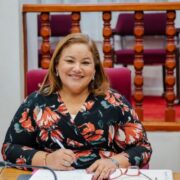Black Immigrant Daily News
News
CABINET has approved a framework for the revised operations of some secondary schools for the period 2022-2027.
In a statement on Tuesday, the Ministry of Education said the objective of the framework was to increase student achievement and equity of educational opportunity.
Data collected by the ministry over the last ten to 15 years shows that an average of 47 per cent of students left school annually without achieving certification in at least five CSEC (Caribbean Secondary Education Certificate) subjects, inclusive of maths and English.
“This greatly limits their ability to continue to tertiary education and find jobs above minimum wage.”
The ministry said other studies done over the years had explored the link that existed between educational achievement, reliance on the government’s support network, and crime.
“This has serious economic, social and security implications.”
The ministy’s data showed that less-than-optimal conditions at some secondary schools have had an impact on the students at those schools.
Those conditions include greater than 60 per cent SEA (Secondary Entrance Assessment examination) intake with scores under 50 per cent, parents with low socioeconomic circumstances and critical school infrastructure in need of repair.
While the ministry said its vacation revision programme would help in providing additional academic and psychosocial support to students who needed it, a more organised, sustained and sustainable systemic approach to school operation was required in some schools to “change their current trajectory with respect to student output.”
On July 1, Education Minister Dr Nyan Gadsby-Dolly said the remedial programme would deal with 9,000 students who scored under 50 per cent in the SEA exam and, as such, would not be adequately prepared for secondary school.
The ministry said principals of selected schools and other education stakeholders such as the TT Unified Teachers’ Association (TTUTA) and the National Parent-Teachers’ Association (NPTA) were consulted on the issues.
The stakeholders shared their experiences and made recommendations on issues such as mitigating school indiscipline and generating a positive school culture.
The recommendations were included in the ministry’s framework.
Specific recommendations are to be implemented on a phased basis and will be aligned with the unique characteristics of selected secondary schools.
The Education Ministry will partner with other government ministries to implement the recommendations which related to leadership, security and discipline.
The security recommendation focuses on things such as increased school patrols, full complement of security officers at schools and the assignment of community police officers to schools.
“Some of these initiatives are already ongoing in schools.”
The detailed implementation of other initiatives require further discussions with education stakeholders.
The ministry said the public would be further updated in due course about the secondary schools that will fall under the new framework
The public will also be informed at a later time of the ministry’s plans to focus on the performance of primary schools.
Catholic Education Board of Management CEO Sharon Mangroo said the denominational boards provided information to the ministry about identifying barriers to student achievement and recommendations for mitigating them.
“I am heartened by the comprehensive approach being signaled and look forward to sustained implementation of mitigating action.”
NPTA president Keith David also welcomed the concept of the framework. But he said, “We need to ensure that our projects are measurable.”
David indicated that some of the initiatives being mentioned in the framework are already being done.
Commenting on the ministry’s announcement, Tabaquite MP Anita Haynes said, “The proof will be in the implementation.
“This Government has been very good with announcements but will get a failing grade at implementation.”
Haynes had no doubt that a less than optimal climate at some schools has been affecting student performance.
“This is an undeniable fact and some serious introspection is also required here because I am sure we will find that government-run schools are falling behind.”
Haynes said, “Therefore, a serious look at what could be done to improve the learning space in the government school to reach the very attainable goal of equity.”
She was alarmed that the statistics provided by the ministry showed that over the last ten to 15 years, 47 per cent of students leave without certification.
“It exposes a significant problem.”
Haynes suggested a disagreation of these numbers could help to better assess the problem.”
NewsAmericasNow.com










